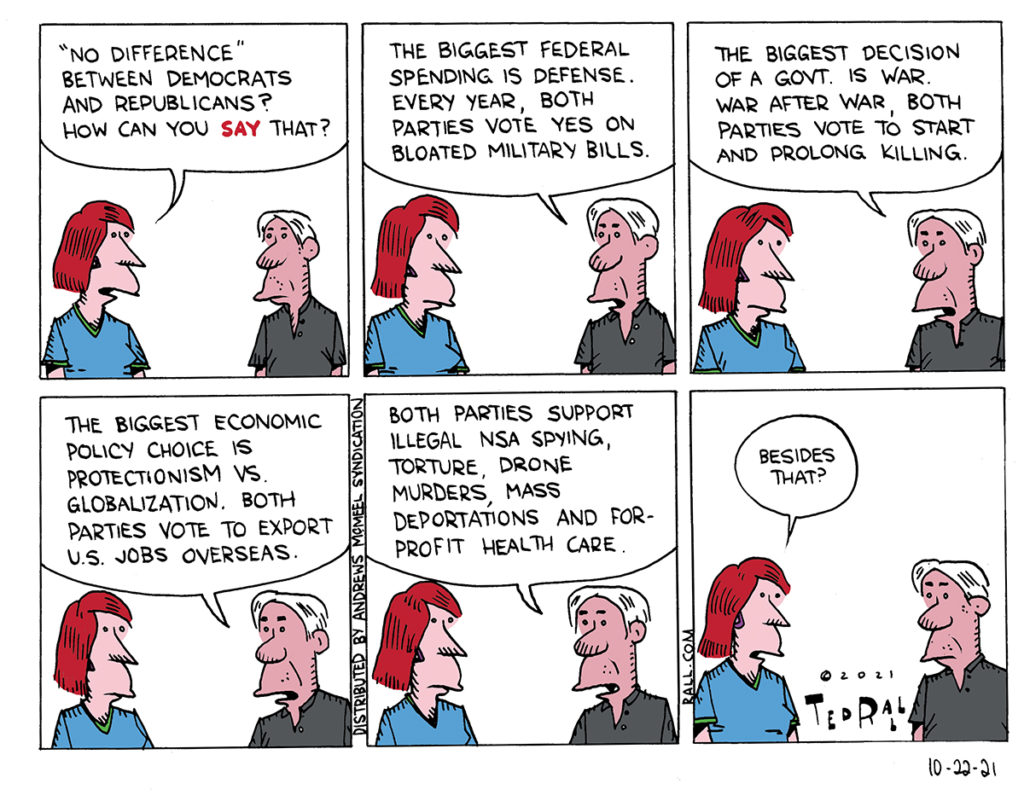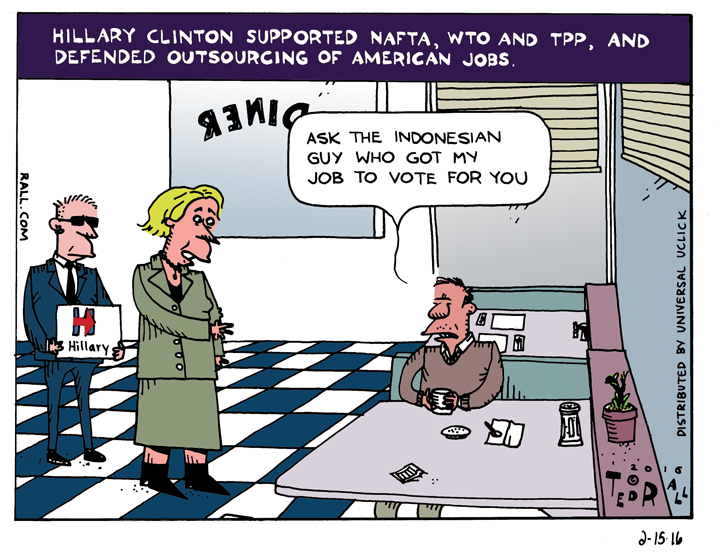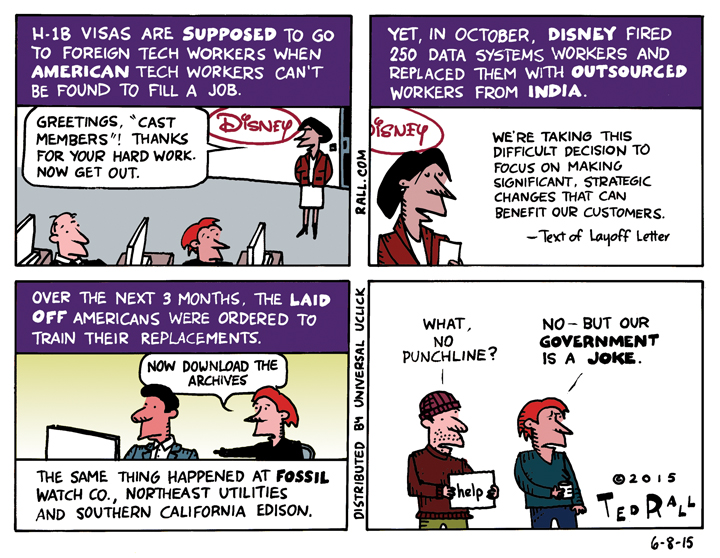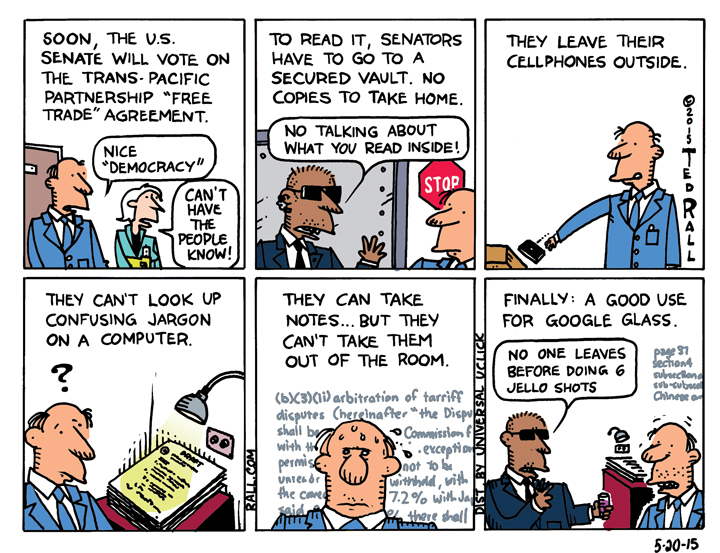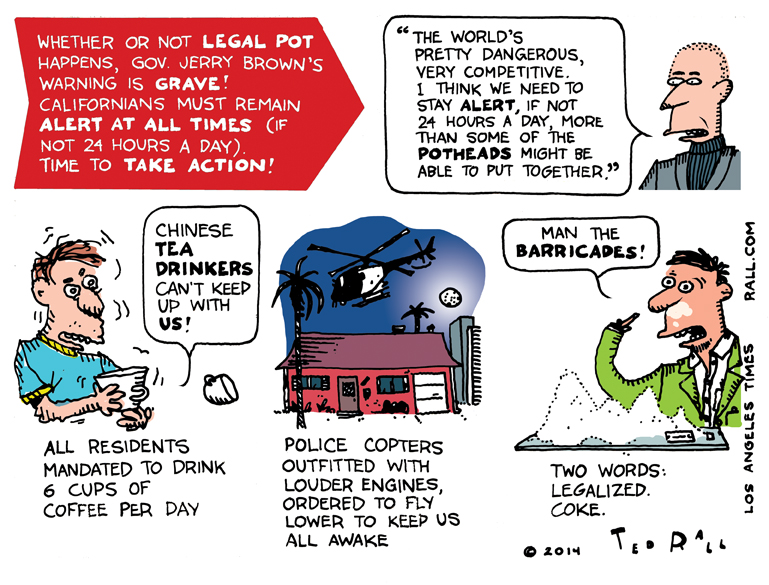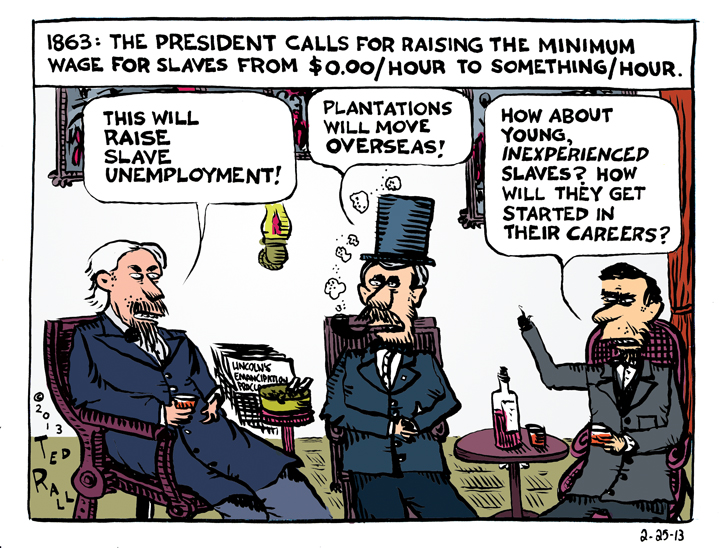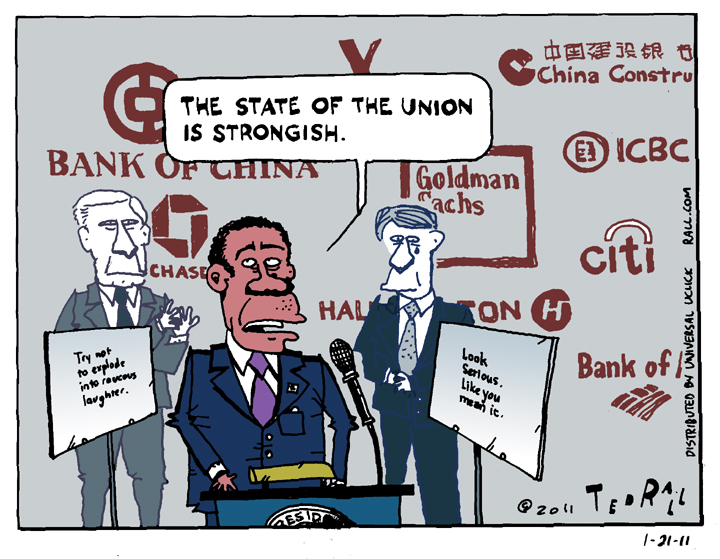Democrats often ask progressives: how can you say that there’s no difference between Democrats and the Republican party? While there are differences of tone, on the most important issues there is little to no difference in policy. And Congressional votes reflect that.
H-1BS
Under the law, H-1B visas are supposed to go to well-educated foreigners to fill tech jobs that American companies can’t fill here in the United States. But companies like Disney and Fossil Watch are firing Americans and replacing them with cheaper foreign workers. Why isn’t the government enforcing the law?
Most Transparent Administration Ever
U.S. Senators who want to read the text of the Trans-Pacific Partnership trade agreement with Asian countries can’t get a copy to read. Instead, they have view the long, confusing document in a secret locked room where they can take notes, but not keep them. The only way they could credibly consider the agreement would be if they had a photographic memory.
LOS ANGELES TIMES CARTOON: Why is Gov. Moonbeam so afraid of legalized marijuana?
Here is my cartoon this week for The Los Angeles Times:
The statewide legalization of marijuana in Colorado, for recreational as well as medicinal use, has prompted serious consideration of the drug’s health effects and socio-political ramifications. Well, that sure took awhile.
On the pro side, it’s been pretty much established that driving stoned isn’t nearly as dangerous as driving drunk. Since 7% of California motorists are cruising the state’s freeways with cannabis in their systems, that provides some comfort. (Sorry, no word on what percentage of the stoners are drunk as well.) Pot also has proven medical benefits; for example, parents of epileptic children are flocking to Colorado.
But the legalize hemp crowd’s timeless rant that pot is harmless is taking some hits.
A recent study claims to have documented the first two known cases of pot-related fatalities. Other studies find that beginning to smoke weed as a teenager — the most common age to start — can affect brain development, causing memory loss, permanently impaired judgment and even reduced IQ.
In musings that might surprise those who remember his “Moonbeam” period (but not those who have noticed there’s no squarer square than an old hippie), Gov. Jerry Brown took to Sunday morning TV to worry aloud that emulating Colorado could leave the state defenseless against (a) foreign business competition and (b) terrorism.
“How many people can get stoned and still have a great state or a great nation?” Brown mused. “The world’s pretty dangerous, very competitive. I think we need to stay alert, if not 24 hours a day, more than some of the potheads might be able to put together.”
The governor didn’t say whether his garbled grammar was attributable to pot or the shortcomings of his secondary education.
I’m always interested in policy appeals motivated by fear. Politicians have unleashed an awful lot of threats — a few real but mostly imagined — during the last decade and a half. And they haven’t exactly made us a better, stronger or more economically successful nation. Brown’s thoughts are nowhere close to the depraved paranoia of Dick Cheney; the idea that California will be morally and economically weakened, its security undermined, because a tiny minority of the state’s residents regularly indulge in the evil weed seems about as serious and substantial as a puff of smoke.
Stay alert? What’s going to happen if we don’t, governor? Are Chinese sweatshop workers going to take a fiscal victory dance on the bones of our stoner-sapped competitiveness? Will our collected stonedness open up the one big chance radical Islamists have been waiting for?
Californians won’t have the chance to vote for legalized pot until November 2016 — if they’re not too wasted to remember.
Slave Wages
Every time Democrats argue for increasing the minimum wage, Republicans trot out the same old arguments: it will increase unemployment, employers will move overseas, and it will increase the barrier for entry for new workers. Studies repeatedly show that none of these things are true, of course, but yet they persist to be argued and reported.
SYNDICATED COLUMN: Weird Times
In Politics, It’s a Wild Wild Weird World
Hunter S. Thompson said: “When the going gets weird, the weird turn pro.” But what do you do when things go from weird to completely psychedelic?
The political landscape at the beginning of the second term of America’s first biracial president – in the usual historical sense, calling him black kind of requires an asterisk – is a messed up, topsy-turvy, bass-ackwards place.
There is the president’s newfound liberal rhetoric, even going so far as to namecheck gays and lesbians in his Inaugural Address. Did anyone tell him or members of the media that Stonewall was an actual riot, that endorsing this landmark of liberation is to endorse violent revolutionary change? He came off as something as a peacenik, implying that he would be willing to talk to, say, Iran. How does that square with his onslaught of drones, a campaign that increasingly looks like a grim Vietnam-style war of attrition?
But it’s his timing I can’t figure.
Back in 2009, when he came into the White House with an overwhelming mandate for radical change in the midst of the worst economic crisis since the Great Depression, when he enjoyed Democratic control of both houses of Congress, when the Republicans were so whipped that opinion writers for the Wall Street Journal wondered aloud whether there was a future for the GOP, he tacked right. Now that obstructionist Republicans control the House, ordinary citizens have settled into a grouchy state of permanent discontent amid downward mobility and shrinking expectations, when there’s absolutely no reason to expect to get anything big or bold accomplished, the dude is breaking out as some sort of crazy progressive?
Then there’s the bizarre realignment of the two major parties.
Leading Republicans, spooked by the election results, polls that show that the voters of the future are liberal on gays, abortion and other social issues, and possibly from finally having picked up dogeared copies of the prescient tome The Emerging Democratic Majority at Books-a-Million, are freaking out in the weirdest possible way. Something has to be done! But not if it requires compromising on our core values. Um, guys…white guys…old white guys…the problem is that the voters don’t like Republican core values. Or you personally. So what is to be done? Something!
You almost have to feel sorry for Republicans. Sure, they started a bunch of crazy wars that killed hundreds of thousands of innocent people, and they opened a string of concentration camps around the world, and they rolled back 800 years of cherished civil liberties that go back to the Magna Carta. But it’s sad to watch the mighty crash like a dictator’s statue pulled down by invading Marines. Not only is a sorta black man in the White House, all the GOP’s classic election-stealing tricks – corrupting the Supreme Court, bullying recount officials with paid thugs, moving voting booths out of minority neighborhoods – aren’t enough to close the growing gap between their obsolete stances and an increasingly left-leaning electorate. Now they’re so desperate that they’re even flirting with rejiggering the Electoral College, an institution that historically benefits Republicans, in order to suck out two or three more terms with them in control of the House – forget the Senate – before fading away into Whig-like oblivion as the Democrats retaliate.
Not to say that the Democrats are walking the straight and narrow road of sanity.
Americans of all political stripes say there’s one issue that consumes them most. One thing that they think about all the time. Something personal, something that affects everything else. Happily, it’s something that the government not only can do something about, but has been able to address many times in the past. I am talking about, obviously, the economy. Unemployment. Underemployment. The fact that there are no jobs. And that the jobs that are being created are all crappy. Or are in another country. Americans have been remarkably consistent about this. It would be hard to think of another time when people told pollsters for four years in a row that the same issue was the number one issue in the country. Whatever his other challenges, President Obama certainly doesn’t have to wonder about what’s on our minds.
So what is his second-term agenda? Given that his laissez-faire approach to the economic collapse throughout his first term basically involved golfing a lot while hoping that magical market forces would revive on their own, you might think that he would focus in like a laser-guided drone on the economy – you know, the number one most important issue to most Americans – this time around. But no, everyone’s telling us that Obama’s ambitious second-term agenda is – wait for it – gun control, immigration and climate change.
Don’t get me wrong: one of the great tragedies of the last dozen years was that Al Gore, one of the few American politicians who understands the gravity and imminent threat of global warming, didn’t get to exercise the presidential powers he earned at the ballot box. Though I will be shocked! shocked! shocked! if Obama’s proposals rise above the level of the usual too little/too late/too vested in corporate profits to curb industrialization, it’s nice to see the issue get lip service. Restoring sanity to America’s immigration system – can’t get in legally, so sneak in and hide out for 15 or 20 years until the next amnesty – is long overdue. Though, again, I wouldn’t be surprised if we just end up with another Reagan-style amnesty that doesn’t open up the doors to a lot more legal immigrants. Gun control of assault rifles and high-capacity magazines, of course, is just boilerplate post-Sandy Hook elementary school massacre reactionism.
Fortunately, at least one of these issues will probably resolve itself. Already there are fewer illegals trying to sneak into the United States across the border from Mexico because the economy here is so terrible. Who is going to want to come to an impoverished nation full of gun nuts shooting at each other underwater?
Still, it’s disconcerting to watch smug Democrats lord it over clueless Republicans when the only difference between the two parties is one of tone. Republicans let you know that they hate you. Democrats talk nice and then let you down. Neither party gives a damn about the fact that you haven’t gotten a raise in 30 years. How can they? Their contributors are the top executives of the corporations who’ve been lining their pockets at your expense.
One of these days, you’ve got to think that the people are going to notice.
COPYRIGHT 2013 TED RALL
SYNDICATED COLUMN: Our Suicidal Ruling Class
Why Won’t the Rich and Powerful Try to Save Themselves?
I spent last week at Occupy Miami and Occupy Fort Lauderdale. One question came up several times: What if the system responds—or pretends to respond—to our demands? What if the political class agrees to create more jobs, help the unemployed, let distressed homeowners keep their houses?
Then the Occupy movement (and American progressivism) will be out of business. “President Obama could finish us off over night,” I said. “A speech would be enough. He wouldn’t even have to do anything.”
Obama could announce a big jobs bill, knowing full well that Congressional Republicans would kill it. It would probably increase his reelection prospects.
But don’t worry.
He won’t.
He can’t.
America’s corporate rulers and their pet politicians know that people are furious. They understand that their actions and policies are accelerating the pace of income inequality and creating a growing, permanently alienated underclass.
They know history. Sooner or later, the downtrodden rise up, overthrow and kill their oppressors.
It’s not a nice way to rule. Nor is it smart. So—if all it would take for America’s masters to save themselves from the raging mobs of the not-so-distant future are a few empty words, why not try?
There’s no doubt about the nature or scale of the problem. Economists from left to right agree that the United States suffers from high structural inequality. “At least five large studies in recent years have found the United States to be less mobile than comparable nations,” reported The New York Times on January 5th. According to a Swedish study 42 percent of American boys raised by parents whose incomes fall in the bottom 40 percent of wage earners remain in the bottom 40 percent as adults—a much higher rate than such nations as Denmark (25 percent) and England (30 percent), “a country famous for its class constraints.”
To be poor in the United States is not unusual. Half of Americans live under two times the poverty line. But the depth and persistence of poverty in America is unique among developed industrialized nations. The gap between the poor and the rich is bigger. Mobility—access to the American Dream—is less.
Born rich? You’ll more likely to die rich in the U.S. than in other countries. Born poor? You’re likelier to die poor.
“Miles Corak, an economist at the University of Ottawa, found that just 16 percent of Canadian men raised in the bottom tenth of incomes stayed there as adults, compared with 22 percent of Americans. Similarly, 26 percent of American men raised at the top tenth stayed there, but just 18 percent of Canadians.”
When family background determines your fate you look for other options. Like getting rid of the system that makes things that way for your kids and their kids. That’s what happened in France in 1789 and Russia in 1917 and China in 1949.
There is no better predictor of revolution than an absence of economic mobility.
Right-wing extremists dismiss empirical data with anecdotal evidence. “If America is so poor in economic mobility, maybe someone should tell all these people who still want to come to the U.S.,” Stuart Butler of the Heritage Foundation told the Times.
Someone should.
Most Americans are poor. They don’t need to read these studies. They’re living them. Which is why they want politicians to create big jobs programs, raise wages, establish permanent unemployment benefits (standard in Europe) and impose a moratorium on foreclosures. The polls are clear.
No one cares about Iran’s supposed nuclear weapons program.
Yet here we are in the heat of a presidential election year, and no candidate—not “liberal” Obama, not the weird Republican, Ron Paul, no one—is talking about the issues Americans care about.
During the 1930s and 1960s liberal leaders ended street protests by promising change. Why not now? Why isn’t anyone promising to address income inequality? They could lie and break their promises later.
First, the rich are feeling squeezed. The global capitalist system no longer has much room to expand. Emerging markets have emerged. Globalization is not only nearly out of steam, it’s allowing the weakest trading partners to drag down their healthier partners. Feeling squeezed, our rulers aren’t in the mood to be generous. They’d rather loot the scraps of the pending collapse than expand the social safety net.
Second, the ruling classes have fooled themselves into believing that they no longer need to exploit workers in order extract surplus value. They make their profits without us in massive arbitrage transactions that collect spreads from borrowed money. To be sure, it’s a bubble. It’ll burst. But it feels good now.
Third, the rich think they can insulate themselves from the roiling masses of the dispossessed, safe behind high-tech alarm systems inside their gated communities. Arrogance rules.
Louis XVI had good security too.
Finally, there has always been a division within the elites between enlightened liberals and hardass thieves. The liberals don’t like us; they fear us. So they try to keep us satisfied enough not to revolt. The thieves count on brute force—cops, pepper spray, camps—to keep the barbarians at bay. The balance of power has shifted decisively to the thieves—which is why figures like Obama can’t even pretend to care about the issues most important to the great majority of people.
(Ted Rall is the author of “The Anti-American Manifesto.” His website is tedrall.com.)
COPYRIGHT 2012 TED RALL
SYNDICATED COLUMN: Stop Demanding Demands
Connecting the Revolutionary Dots in Occupied Washington
“Our demand is that you stop demanding that we come up with demands!”
I thought about that line a lot this past week. (It’s from a recent cartoon by Matt Bors.) I was at Freedom Plaza in Washington, a block from the White House, at the protest that began the whole Occupy movement that has swept the nation: the October 2011 Stop the Machine demonstration.
It has been one of the most exciting weeks of my life.
Stop the Machine, timed to begin on the October 6th anniversary of the U.S. invasion of Afghanistan ten years ago, was based on a simple, powerful premise. A coalition of seasoned protesters including Veterans for Peace, CodePink, Fellowship of Reconciliation, Progressive Democrats of America and Peace Action would take over a public space, then refuse to leave until our demand–withdrawal from Afghanistan–was met.
Adbusters magazine preempted our demonstration, which had been widely publicized, with Occupy Wall Street.
It’s the sort of thing an unscrupulous businessman might do.
But it’s all good. The sooner the revolution, the better. And the Occupy folks did choose a better name.
Like other old-timers (I’m 48), I criticized Occupy Wall Street for its wanky PR and street theater shenanigans. Yoga, pillow fights and face painting for the masses, but do the masses give a damn? Critiquing with love, I joined others in the media for demanding specific demands. That, after all, is how agitators used to do things. Hijack a plane and ask for money. Take over a prison until the warden agrees to improved conditions. Strike until you get a raise.
That’s one of the things that changed on 9/11. No one ever claimed responsibility for the attacks. No group issued any demands.
The Stop the Machiners in Freedom Plaza are mostly Gen Xers in their 40s and Baby Boomers in their 50s and 60s-. There are hundreds, sometimes thousands, of them, many spending the night in tents. Eight blocks away in McPherson Square is Occupy DC, the decidedly younger and whiter (mostly Gen Yers in their 20s) Washington spin-off of Occupy Wall Street. As you’d expect, Occupy is wilder and more energetic. As you’d also expect, Stop the Machine is calmer and more organized.
Stop the Machine has Portapotties.
It even has a station where you can wash your hands after you use the Portapotties.
“What are your demands?” my friends back home emailed me. Trust me: No one is more aware of the need to issue demands than the protesters of the Occupy and Stop the Machine movements (who obviously ought to merge).
Coming up with demands is job one. But job one is slow going. This is not merely a non-hierarchical but an anti-hierarchical movement. Everyone gets an equal say. Influenced by the Occupy movement (and other progressive protests, such as the anti-globalization struggle), Stop the Machine has embraced a system in which all decisions are arrived at by unanimous consensus. Anyone, regardless of their social status or education, can block a decision agreed upon by hundreds of other people.
Before last week I thought this decision-making process was madness. No leaders means inefficiency, right? Well, right. Meetings drag on for hours. Often nothing, or very little, gets done. Discussions go off on tangents. Poorly informed and even mentally disabled people get to talk. And everyone–even those of us with years of political experience and education–have to sit there and listen.
It sucks. And it’s great. It’s great because it gets out from behind our keyboards and out into the streets and in direct contact with our fellow human beings.
I’m as snotty as they come. Out on the Plaza, however, snark is a liability. A scary homeless guy heckled me while I gave a speech calling for revolution over reform of the system; he went on so long and so intensely that a D.C. cop tried to take him away. I couldn’t just click away. I was forced to engage with him. To discuss. To agree to disagree.
Revolution is a messy, slow process. We are just beginning to claw away at the velvet ropes of alienation that simultaneously comfort and confine us. We’re beginning to see that the things we hold so dear–our place in the class structure, our educational credentials, our shrinking but oh-so-clever circles of friends–are means of oppression.
There were 15 committees formed to come up with demands about various topics, which would eventually be presented to the General Assembly for discussion and, with luck, approval by consensus.
I joined the Economics and Finance committee.
“I don’t understand the word ‘neoliberal’,” a woman who looked to be about 30 said.
“It means conservative,” a guy answered.
No it doesn’t.
I shut up. In consensus meetings, you quickly learn to choose your battles. Those battles can run late into the night.
I urged our committee to decide whether we were revolutionaries or reformists.
“Why does it matter?” asked our “facilitator” (the leader-who-is-not-a-leader).
We went on to waste the next several months debating the distinctions between revolutionaries who seek to overthrow the system, reformists who accept its basic structure but seek to improve upon it, and revolutionists-posing-as-reformers who issue what I call “unreasonable reasonable” demands–demands that are popular with the population but that the system can’t concede without undermining the essential nature of their relationship to the people, the idea being to expose the government as the uncaring, unresponsive monsters, thus radicalizing the moderates and fence-sitters.
OK, it was about an hour. It only seemed like months.
We only came up with two demands for the general assembly to consider. But that doesn’t matter.
The process of discussion educates everyone involved in it. Obviously, the better informed share information with the less informed. But the knowledge flow goes both ways. The better informed learn what is not known, what must be transmitted to the public at large. And of course the less informed about one topic are usually better informed about another.
Demands will surface. But there’s no rush. Let the intellectual cross-fertilization run its course.
Besides, it’s fun to watch the ruling-class-owned media squirm as they wait.
(Ted Rall is the author of “The Anti-American Manifesto.” His website is tedrall.com.)
COPYRIGHT 2011 TED RALL

